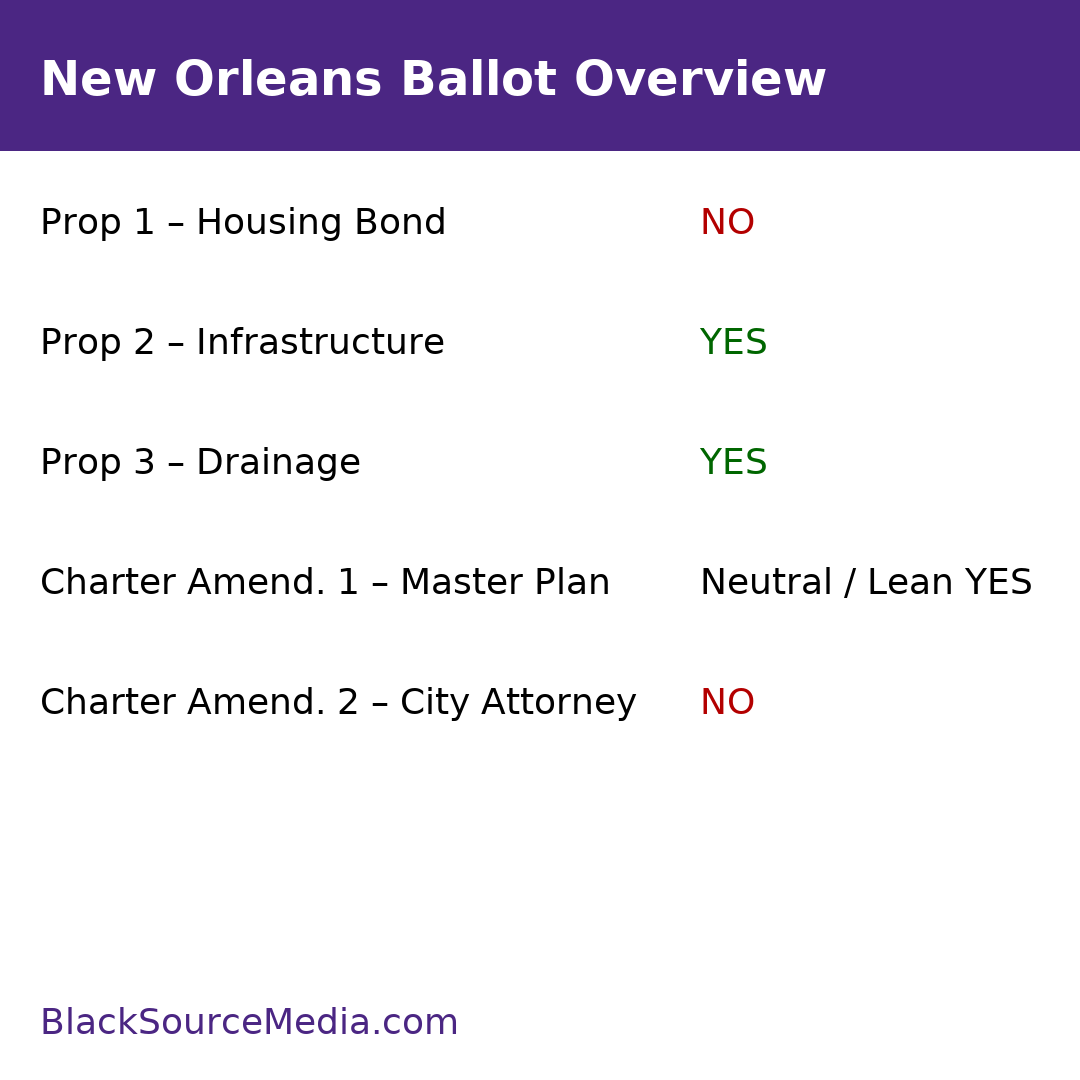New Orleans voters face five major items on the ballot. They deal with housing, infrastructure, drainage, and the distribution of power inside City Hall. None of these proposals are symbolic. They will shape who gets to live in this city, how we maintain it, and how decisions are made for years to come.
This guide explains what each measure does, what a YES vote means, what a NO vote means, and then offers my political analysis of what is really at stake.
Your vote is your decision.
My goal is clarity, not telling you how to vote.
Proposition 1 — Affordable Housing Bond ($45 Million)
What it does:
Allows the City to borrow up to $45 million to build, renovate, or acquire affordable housing. The debt is paid back over time using the existing property tax millage used for city bonds.
A YES Vote Means:
- The City can borrow funds to support housing development projects.
A NO Vote Means:
- Housing initiatives must rely on the Housing Trust Fund, federal funds, tax credits, or other non-debt sources.
Political Analysis:
New Orleans has a real housing crisis. Families are being priced out. Increased property values mean higher property taxes and higher insurance bills. As a result, our neighborhoods are losing long-time residents. So the word “housing” on a ballot attracts immediate support. But the details matter. Let’s look at what this proposal really does and how it impacts our communities.
This measure uses 30-year debt to address a crisis that is happening right now. Bond dollars move slow. They come with red tape and multi-year project timelines. Meanwhile, voters already approved the Housing Trust Fund to get dollars directly into the community faster.
Housing advocates argue this bond could create a shell game where the City uses bond dollars as a substitute for real annual investment. Meaning the Housing Trust Fund never gets properly funded, and the housing crisis drags on while officials claim progress on paper.
The question here is not whether we need affordable housing.
We do.
The question is whether slow, long-term debt is the right tool for an urgent, displacement-level crisis.
Proposition 2 — City Infrastructure Bond ($415 Million)
What it does:
Allows the City to borrow money to repair and upgrade streets, bridges, public buildings, parks, public safety facilities, technology systems, and service equipment.
A YES Vote Means:
- The City continues critical repair and modernization projects.
A NO Vote Means:
- Project delays, scaling back, or cuts to basic city services to free up cash.
Political Analysis:
New Orleans infrastructure has been neglected for decades. Roads are failing. Recreation centers are outdated. Public buildings need major repairs. Infrastructure is a long-term asset, so long-term financing is appropriate.
Without this bond, the City would either delay repairs, raise taxes, or cut services. None of those help neighborhoods. This is the backbone funding that keeps the city operational.
Proposition 3 — Drainage & Stormwater Bond ($50 Million)
What it does:
Allows the City to borrow for drainage infrastructure, pump stations, and stormwater management improvements.
A YES Vote Means:
- Flood mitigation projects can move forward now.
A NO Vote Means:
- The City must depend on slower, less reliable state and federal funding.
Political Analysis:
We live in a bowl. Flooding is not theoretical — it’s routine. Every heavy rain is a reminder that the drainage system is aging and struggling.
A failure to invest here raises insurance costs, destroys property, and accelerates the displacement of Black homeowners who can’t absorb repair costs. Floodwater is not just a natural disaster — it’s an economic force.
This measure is about timing: Do we fix what we know is broken now, or wait until the next flood forces the issue?
Charter Amendment 1 — Master Plan Review Deadlines
What it does:
Changes the review timelines for how the City Planning Commission and City Council evaluate updates to the Master Plan.
A YES Vote Means:
- Longer review time for planning bodies to analyze proposed land-use changes.
A NO Vote Means:
- Current review deadlines remain.
Political Analysis:
This amendment does not transfer power from one branch to another. It simply adjusts how fast planning decisions move. Supporters say more time leads to better analysis and more community engagement. Critics worry delays could slow needed development.
This is procedural. Not ideological.

Charter Amendment 2 — City Attorney Independence
What it does:
States that the City Attorney represents the City, not just the Mayor. It also allows the City Council to block the Mayor from firing the City Attorney under certain circumstances.
A YES Vote Means:
- If this amendment passes, the City Attorney would no longer report to just the Mayor. The City Council could block the Mayor from firing them, which means the City Attorney would effectively have two bosses. When the Mayor and Council disagree, the City Attorney could get stuck in the middle instead of being able to give clear legal advice..
A NO Vote Means:
- The Mayor keeps full authority to appoint and remove the City Attorney.
Political Analysis:
This amendment goes beyond ethics. It restructures who controls legal power inside City Hall.
Supporters argue the City Attorney should not be punished for giving honest legal advice. That is true. But this amendment also creates a scenario where the City Attorney could be caught between two political forces — the Mayor and the Council — each demanding loyalty.
When the lawyer becomes the battleground, governance breaks down.
This measure risks locking the City Attorney into permanent political trench warfare, especially when the Mayor and Council are already at odds.
The Bottom Line (Political Analysis Summary)
| Proposal | My Perspective | Reasoning |
|---|---|---|
| Prop 1 – Housing Bond ($45M) | NO | Protect the Housing Trust Fund; avoid slow, debt-driven housing strategies. |
| Prop 2 – Infrastructure Bond ($415M) | YES | Long-term physical infrastructure requires long-term financing. |
| Prop 3 – Drainage & Stormwater ($50M) | YES | Flood risk is urgent. Delay is costly. |
| Charter Amendment 1 | Neutral / Lean YES | Procedural change with limited impact on power dynamics. |
| Charter Amendment 2 | NO | Could intensify political dysfunction and reduce effective legal governance. |
Closing
Your vote determines whether New Orleans invests in the people who live here now or continues a slow drift into becoming a city for someone else.
You do not have to vote all yes or all no. Each item stands on its own.
Vote with clarity. Vote with strategy.
Please vote like staying here matters — because it does.


Thank you for your own great publication that has a special democratic effect, as per this highly accessible comment box.
Prop 1 – Yes, because affordable housing is also a long term dilemma; perhaps this will allow more of the current affordable housing bond $ to be used to keep our working poor/elderly in their own homes.
Charter Amendment 2 – This seems to have come up because we have too much power vested in the Mayor, who is elected citywide. The council district members are the most democratically elected at this level, due to the size of their districts (albeit too large). Therefore, an argument is where is it most democratic? Always, we want more democracy.
Infrastructure 1: While we have a financial gun to our heads to fund the city, let’s take time to examine the real issues here: The problem is how much public funding goes to private interests with no community benefit agreements. Someone needs to break down the funding and make public if this is just more funding that benefits the neighborhoods on the uptown side of Esplanade. When will there be a major city park for the ninth ward. Joe Brown is too far for most of downtown residents. What are the major developments funded in the lower/upper 9th? zip.